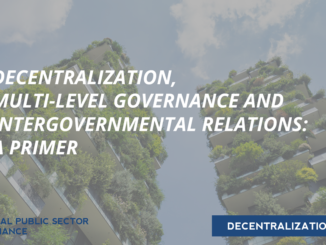
As a global professional network promoting inclusive local governance and sustainable localized development around the world, LPSA recognizes the importance of stakeholders having a common vocabulary when discussing issues related to decentralization, multilevel governance, and the local public sector. The need for a shared understanding of concepts and definitions is particularly pertinent given the global diversity and multidisciplinary nature of the global Community of Practice working on different aspects of decentralization and localization.
Unfortunately, there is currently no set of decentralization definitions that is universally recognized as authoritative across the different disciplines that contribute to the literature on decentralization and multilevel governance, including—but not limited to—law, public administration, political science, and economics.
In the absence of an authoritative global definitional framework, different global institutions and different scholars have defined key decentralization terms differently or—when convenient—have simply chosen to omit a precise definition. In other cases, definitions are provided, but are inconsistently applied.
As a result, policy makers, scholars, and even legislation in different countries may attach slightly different meanings to a specific decentralization term. Furthermore, it is not unusual for a term to be assigned a more precise technical definition compared to the meaning of the term in common parlance. All of these factors contribute to potential confusion when having a dialogue among global stakeholders on issues related to decentralization, multilevel governance and the local public sector.
With the intent to move towards global consensus on a comprehensive and consistent set of definitions related to decentralization, multilevel governance, and local public sector, the Local Public Sector Alliance has prepared a glossary of key decentralization definitions and concepts. Many of the core definitions included in this glossary are based on the work of Professor Dennis Rondinelli, who—as a leading scholar-practitioner in the field, along with colleagues—articulated a set of coherent definitions in the 1980s and 1990s that have become—over the past four decades—recognized by many as offering the de facto consensus definitions of key decentralization concepts.
In other cases, the glossary builds on definitions formally agreed by multilateral organizations, including the International Monetary Fund, World Bank, United Nations and OECD (e.g., the System of National Accounts 2008). In yet other cases, the glossary builds on definitions offered by the Local Public Sector Alliance (and its precursor, the Local Public Sector Initiative) over the past decade.
The glossary aims to provide definitions that are concise, clear, and precise. When possible, each definition identifies the class of objects or concepts that the term belongs to, in addition to identifying the distinguishing characteristics that differentiate the term from others in its class. In formulating the definitions, consideration was given to the desire to arrive at definitions that are not just academically accurate, but operationally relevant.
In addition to offering the definitions themselves, this document also offers background to the definitions through extensive clarifying notes. Where necessary, these clarifying notes point out when terms have been used in different meanings, especially when such alternate meanings diverge from (or are inconsistent with) the meanings ascribed to them in the prevailing literature.
View LPSA’s Decentralization, Multilevel Governance and Local Public Sector Glossary (PDF).
Visit LPSA’s Glossary landing page.
Access LPSA’s Primers and Guides.




